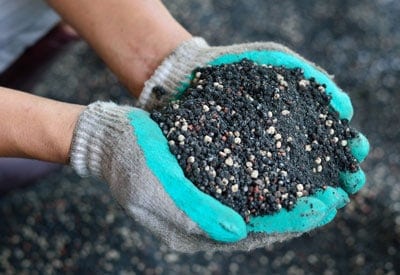“We know more about the movement of celestial bodies than about the soil underfoot.” – Leonardo Da Vinci, circa 1500’s
Before you grow your organic garden, grow your soil. This often-repeated wisdom is simple to say but requires some work to make happen. Busting up clay, building up sand, and tweaking to get the pH level that plants adore takes time and preparation. Since each patch of ground is unique, there are no quick and simple answers.
Growing soil — making it ideal for growing vegetables, flowers, lawns and other plants — means bringing it to life. How?
- by making sure its acid/alkaline or pH balance is perfect for what you’re growing,
- by providing all the nutrients that your soil may lack and your plants require,
- by improving its structure so that it holds oxygen your plants need as well as retaining necessary moisture and providing critical drainage,
- by supplying and encouraging strong populations of beneficial microbes that will stimulate the health and growth of your plants.
Most soil amendments are added to improve the structure of the soil, to increase the organic content so that the soil is more capable of holding nutrients and moisture. When these organic materials are added to the soil, they also act in varying degrees as fertilizers, providing a mix of nutrients to plant roots. By first determining the needs of your soil, you can best determine what you should add. Need nitrogen? Want to sweeten the pH of your soil? Want to increase moisture-holding ability or break up heavy clay soils? Looking to increase microbial activity or the general organic content of your soil? The chart below lists commonly used organic amendments that are safe, natural corrections for your soil’s deficiencies and tools for maintaining its health.
Soil Amendments |
||
|
Name
|
Description
|
Application
|
| Alfalfa Meal | Primarily a plant source of nitrogen, Alfalfa Pellets (5-1-2) also contains trace minerals and triacontanol, a plant growth promoter. | 25-50 lbs. per 1,000 sq. ft. |
| Azomite | A natural source of minerals and trace elements! Azomite is used in gardens as a re-mineralizer for soils and an anti-caking agent in animal feeds. | 1-2 lbs. per 100 sq. ft. |
| Blood Meal | A strong, slow release source of nitrogen, Blood Meal (13-1-0) is also chock-full of trace minerals. | 10-30 lbs. per 1,000 sq. ft. |
| Bone Meal | Granulated for easy application and quick uptake by plants, Bone Meal contains 20% phosphate and up to 23% calcium. | 10-35 lbs. per 1,000 sq. ft. |
| Chicken Manure | Composted Chicken Manure (3-2-2) provides a well balanced supply of nutrients and is excellent for mulching and moisture retention. | 1 cu. ft. covers 200 sq. ft. |
| Coconut Coir | Made from compressed coconut fiber, coir is an eco-friendly peat alternative! Works anywhere you would normally use peat moss, rockwool, vermiculite, perlite or pumice. | 1 part coir to 2-3 parts soil. |
| Compost | No amount of organic fertilizer can make up for poor soil. Compost provides a microbially active source of organic matter and other important soil builders required by plants. | Up to 20 lbs. per 100 sq. ft. |
| Greensand | Contains about 7% total potash, along with iron, magnesium, silica and as many as 30 other trace minerals. May also be used to loosen heavy, clay soils. | 50-100 lbs. per 1,000 sq. ft. |
| Gypsum | Used to loosen heavy clay soils, Agricultural Gypsum contains about 23% available calcium and 18% sulfur. | 40-120 lbs. per 1,000 sq. ft. |
| Kelp Meal | A great source of micronutrients and beneficial plant growth promoters. Kelp Meal also encourages tolerance to stresses such as pests, disease, frost and drought. | 5-20 lbs. per 1,000 sq. ft. |
| Dolomite Lime | Sweetens soil (raises pH in acidic soils) and is a quality source of calcium (Ca) and magnesium (Mg). Promotes healthy plant growth. | 25-50 lbs. per 1,000 sq. ft. |
| Rock Dust | Improves soil vitality and plant health. Rock Dust contains a broad range of trace minerals, many of which have been lost through the ages, by erosion, leaching and farming. | 50-150 lbs. per 1,000 sq. ft. |
| Rock Phosphate | Provides up to a 10 year reserve of phosphorous! Contains 27% total phosphate, 33% elemental calcium and many other trace minerals. Great for flowering plants. | 50 lbs. per 1,000 sq. ft. |
| Shellfish Meal | A source of calcium (23%), nitrogen, phosphorus and trace minerals. Contains chitin, which stimulates the growth of soil microbes that inhibit root-knot nematodes. | 30 lbs. per 1,000 sq. ft. |
| Sulfur | Lowers pH in alkaline soils. Elemental Sulfur contains 90% sulfur with 10% bentonite as a binder. Great around acid loving plants such as blueberry, azalea and rhododendron. | 10 lbs. per 1,000 sq. ft. |
| Sul-Po-Mag | Also known as sulfate of potash-magnesia, Sul-Po-Mag is a quick release source of potassium and contains 22% soluble potash, 22% sulfur and 11% magnesium. | 5-10 lbs. per 1,000 sq. ft. |
| Worm Castings | Gardeners know Worm Castings to be the most nutrient dense organic compost available. In soil, they retain water and release nutrients in a form that is easily used by plants. | 5-10 lbs. per 100 sq. ft. |











